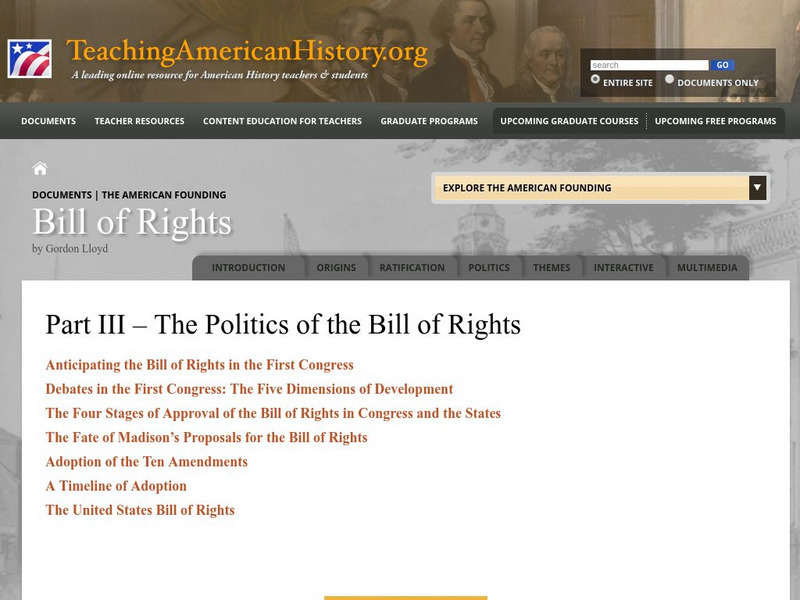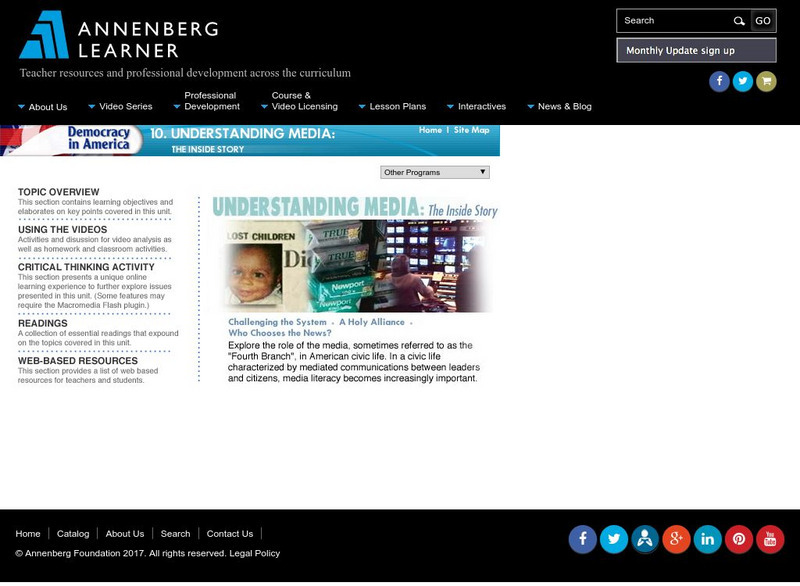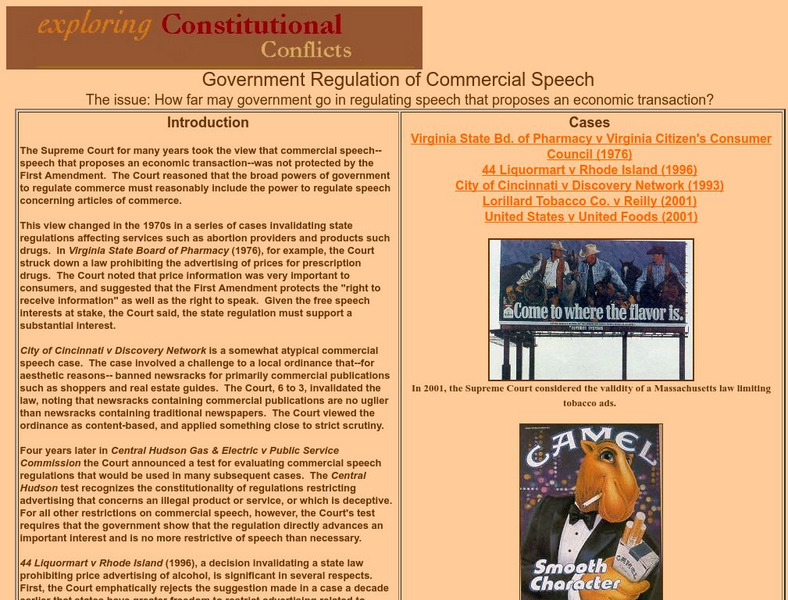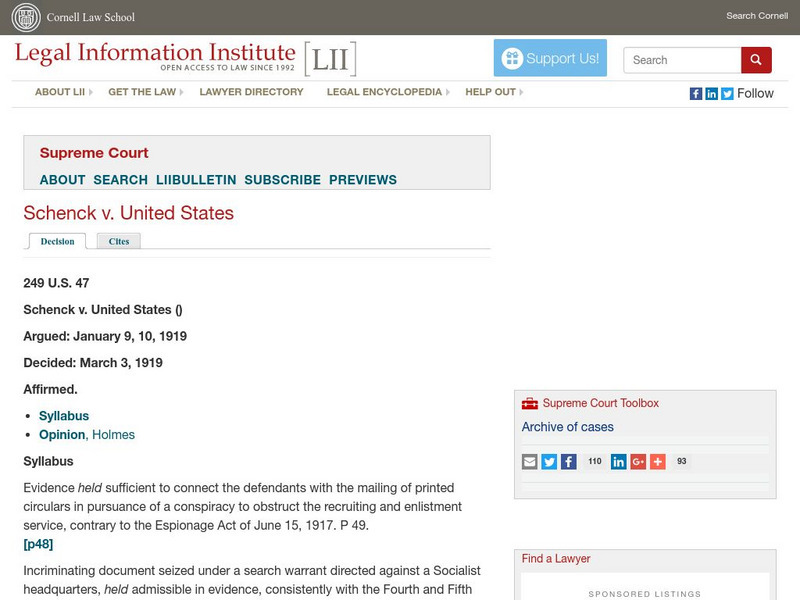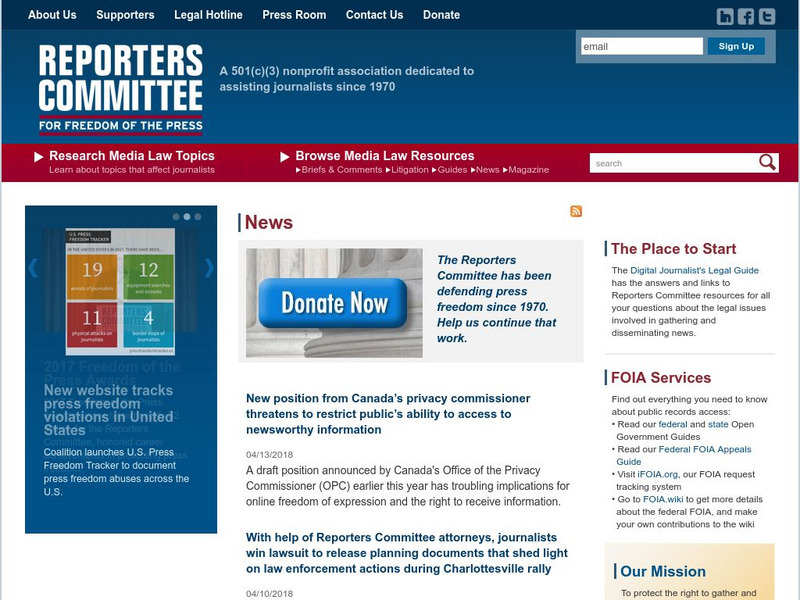Hi, what do you want to do?
Teaching American History
Teaching American History: The Politics of the Bill of Rights: Part Iii
Investigate what the politics were leading to the creation of the Bill of Rights. Identify how the debates in the first congress led to the stages of approval and ultimately the adoption of the ten amendments to the U.S. Constitution.
University of Missouri
Exploring Constitutional Conflicts: The "Clear and Present Danger" Test
Modern first amendment law was formed by cases during the WWI era. Were dissent and subversive activity protected by freedom of speech? Examine five cases that answered this constitutional question. Included are the full opinions of the...
University of California
The History Project: Ideas and Strategies of the Woman Suffrage Movement
Although the campaign for Woman Suffrage in the United States began with the Seneca Falls Convention of 1848, six decades later the leaders of the movement could claim victories in only four, sparsely-populated Western states, Colorado,...
Independence Hall Association
U.s. History: The Fight Against "Demon Rum"
The Eighteenth Amendment showed how difficult it is to legislate morality. Read about the advantages of Prohibition, especially in terms of public health. The disadvantages far outweighed the advantages. See how lawlessness increased...
Bill of Rights Institute
The Bill of Rights Institute: The Bill of Rights
The first 10 amendments to the Constitution make up the Bill of Rights. Written by James Madison in response to calls from several states for greater constitutional protection for individual liberties, the Bill of Rights lists specific...
Digital History
Digital History: The Bill of Rights
Find a list of the first ten amendments to the Constitution, the Bill of Rights, and see why these additions were made to the ruling document.
Illinois Institute of Technology
The Oyez Project: Bigelow v. Virginia (1975)
Brief overview of the Bigelow v. Virginia (1975) Supreme Court case.
Other
University of Arkansas: The Ordeal of Religious Test Oaths in Pennsylvania
An argumentative essay on the underlying premise of political theory which deals with religious test oaths.
PBS
Pbs Teachers: On Stage at the Kennedy Center: The 2001 Mark Twain Prize
This Teacher Resource from the Kennedy Center helps learners examine where and how humorists derive the material presented to their audiences. Activities encourage students to analyze elements of humor and the style of entertainers, and...
PBS
Pbs News Hour Extra: Lesson Plan: Policing the Airways
This lesson plan looks at the current controversy of the FCC and making media outlets more accountable for what comes over their airways. In particular, the Super Bowl Halftime Show is discussed and looked at.
Annenberg Foundation
Annenberg Learner: Democracy in America: Understanding Media: The Inside Story
This unit highlights the integral role that the media plays in American politics to communicate between the leaders and the public. Offers video, readings, web resources, and activities.
Library of Congress
Loc: Religion and the Founding of American Rep.: Religion and the Federal Gov
This site from the Library of Congress presents selections of articles, writings, and pictures that summarize the beliefs of the early American politicians that morality and personal independence were essential for the country. Links to...
US National Archives
Our Documents: The Bill of Rights (1791)
An interactive experience with the Bill of Rights. The Our Documents group allows you to view a copy of the original Bill of Rights. There is a brief information section along with links to larger images, a typed transcript, and...
PBS
Pbs News Hour Extra: Supreme Court Considers Free Speech and Protests
Hateful as these actions may seem to many people, do groups still have the right to protest under the First Amendment? Read about the case that the Supreme Court is considering involving protests at a military funeral.
iCivics
I Civics: Texas v. Johnson (1989)
This mini-lesson covers the basics of the Supreme Court's decision that burning the American flag is a form of political speech protected by the First Amendment. Students learn about the First Amendment freedom of speech and the...
iCivics
I Civics: Clapper v. Amnesty International (2013)
This mini-lesson covers the basics of the Supreme Court's decision that determined the government's ability to conduct electronic surveillance of its citizens. Students learn about the First Amendment right to free speech, the Fourth...
iCivics
I Civics: Bethel School District v. Fraser (1986)
This mini-lesson covers the basics of the Supreme Court's decision that established a school's ability to prohibit inappropriate student language on campus. Students learn about the First Amendment right of free speech, and explore the...
iCivics
I Civics: Lyng v. Northwest Indian Cemetery Protective Association (1988)
This mini-lesson examines the Supreme Court case that pitted the interests of government economic projects against the religious rights of American Indians. Students learn about the religious protections of the First Amendment's Free...
iCivics
I Civics: West Virginia State Board of Education v. Barnette (1943)
This mini-lesson covers the basics of the Supreme Court's decision that it was unconstitutional for a state to force students to salute the flag and recite the Pledge of Allegiance. Students learn how the interests of national unity and...
University of Missouri
Exploring Constitutional Conflicts: Government Regulation of Commercial Speech
Explore the issue of commercial speech -- think Joe Camel, the Marlboro Man -- which is speech that proposes an economic transaction. Is it covered by the First Amendment?
Cornell University
Cornell University: Law School: Schenck v. United States (1919)
Features a syllabus of the landmark Supreme Court case of Schenck v. United States which decided that the defendant's right to criticize the draft was not protected by the First Amendment.
iCivics
I Civics: Citizens United v. Federal Election Commission (2010)
This mini-lesson covers the Supreme Court's decision about limiting government restrictions on campaign contributions. Students learn about campaign finance, Super PACs, the Bipartisan Campaign Reform Act (McCain-Feingold Act), and the...
iCivics
I Civics: Minersville v. Gobitas (1940)
This mini-lesson covers the basics of the Supreme Court's decision that allowed schools to require learners to salute the flag and recite the Pledge of Allegiance. Students learn about the First Amendment and how the interests of...
Reporters Committee for Freedom of the Press
Rcfp: The Reporters Committee for Freedom of the Press
This non-profit organization collects instances of First Amendment and Freedom of Information cases throughout the United States and reports on the facts and outcomes. An interesting cross section from this section of our law.





